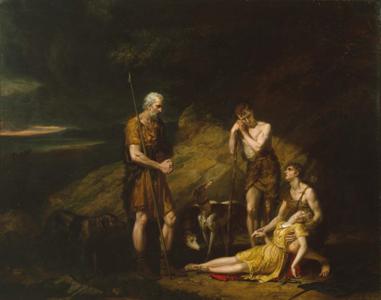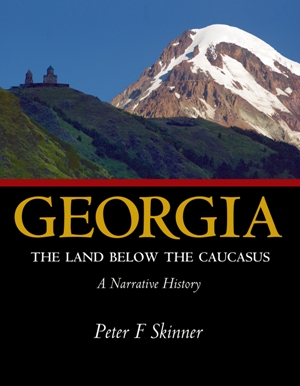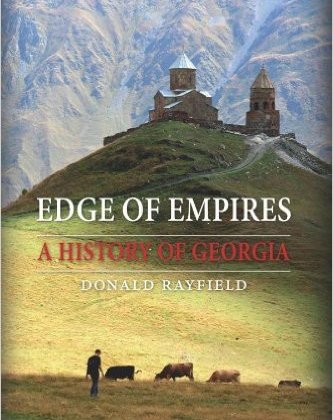

|
The Kartvelologist The Kartvelologist” is a bilingual (Georgian and English) peer-reviewed, academic journal, covering all spheres of Kartvelological scholarship. Along with introducing scholarly novelties in Georgian Studies, it aims at popularization of essays of Georgian researchers on the international level and diffusion of foreign Kartvelological scholarship in Georgian scholarly circles. “The Kartvelologist” issues both in printed and electronic form. In 1993-2009 it came out only in printed form (#1-15). The publisher is the “Centre for Kartvelian Studies” (TSU), financially supported by the “Fund of the Kartvelological School”. In 2011-2013 the journal is financed by Shota Rustaveli National Science Foundation. |
''The Man in the Panther Skin'' and ''Cymbeline''
My research published in the previous issue of The Kartvelogist was unexpected (or more precisely, sensational) news in the field of comparative literature both for Rustaveli and Shakespeare Studies. It claimed that the plot of Cymbeline, one of the last works of Shakespeare, is based on the story of Tariel and Nestan in Rustaveli’s the MPS. These conclusions followed my discovery that the MPS is the source of the plots of two plays by Shakespeare’s junior contemporaries Francis Beaumont and John Fletcher – A King and No King and Philaster. What led me to this conclusion is the fact that the action in A King and No King takes place in Georgia (Iberia) and, additionally, that the main character of the play, the princess and the successor of the throne who is in love with her brother (adopted, as it transpires later), has a name that suggests Nestan by a homographic-homophonic pun, or punning speech.
keywords:Rustaveli; Shakespeare; Beaumont and Fletcher; “The Man in the Panther Skin”; “Cymbeline”; “Philaster” Category: SCHOLARLY STUDIES Authors: ELGUJA KHINTIBIDZE Existing German translations of the epic by Rustaveli
The present article discusses the poetic and prosaic German translations of The Man in the Panther Skin by Shota Rustaveli, namely, translations by Artur Leist, Hugo Huppert, Ruth Neukomm, Michael Tseretheli, Hermann Buddensieg and Marie Prittwitz. A detailed list of German translations and publications of The Man in the Panther Skin is given in the following books: Die Literaturen der Völker Kaukasiens [2] and Georgian Literature in European Scholarship [4]. This article will focus on the poetic and prosaic translations of the poem that represent complete or almost complete translations into the German language:
keywords:Rustaveli, The Man in the Panther Skin, German translations. Category: CHRONICLE OF EVENTS Authors: STEFFI CHOTIWARY-JÜNGER The “Lost” Country: Why is Georgian History and Culture so Little Known in the English-speaking World?
The article demonstrates great love for and admiration of rich Georgian culture and its old, heroic history. Though, it also deals with the frustration with the fact that there are very few publications about Georgia in English and they are not available for wide circles of readers. I believe that scholars and cultural professionals should take into account the researcher’s remarks. We should manage to listen to the remarks full of compassion towards us and improve the situation. The article is published both in English and Georgian (translated by Mr. Kiknadze). keywords:history of Georgia, Georgian literature, Piter Scinner Category: SCHOLARLY STUDIES Authors: Peter Skinner Donald Rayfield’s ”A History of Georgia”
Professor Rayfield demonstrates a profound knowledge of varied written sources on which his work is based and, at the same time, the book reads easily and with interest. While re-telling about the history of Georgia the author, who is an excellent philologist and literary critic, emphasises the episodes that are vividly narrated from the source material. keywords:Donald Rayfield, A History of Georgia Category: SCHOLARLY STUDIES Authors: Levan Gordeziani
The Name of a Saint Disclosed and Established through Iconography
None of the old Georgian sources from the 9th century to the 1830’s mentions the name of ‘Sidonia’, the sister of Elioz, who brought the Lord’s tunic from Jerusalem to Mtskheta. Sidonia is not depicted or mentioned either on the murals, miniatures, or icons dating back to the 9th to 13th and also the 17th to 19th centuries that represent the erection and ascension of the living pillar or on the seals of the catholicoses of the 17th and 18th centuries, or the flag of Vakhtang VI. In the stories of Life of Saint Nino, published in the 19th century, Elioz’s sister is mostly referred to as ‘Sidonia,’ and the understanding is that she is well known to Georgians. In Teimuraz Bagrationi’s work – The History of Iveria from the Origins …, for the first time in 19 centuries, we encounter the name of Sidonia, the sister of Elioz and the embracer of the Lord’s tunic. The placement of the name ‘Sidonia’ in brackets at the mention of Elioz’s sister in Nikoloz Gulaberidze’s Sakitkhavi (The Reader), which was included in M. Sabinin’s book Georgia’s Paradise and the mentioning the name of Elioz’s sister on the icon The Glory of the Holy Orthodox Church of Georgia greatly contributed to the popularization and establishment of the name of Elioz’s sister - ‘Sidonia.’ keywords:Sidonia, Teimuraz Bagrationi, M. Sabinin Category: SCHOLARLY STUDIES Authors: Nana Gonjilashvili Georgian Hymnographers
Ioane-Zosime, The Praise and Magnification of the Georgian Language; Phillip of Bethlehem, Praise of Bethlehem, the Virgin and the Son; Borena, “O Virgin who...” In the current issue of The Kartvelologist original hymns by Georgian hymnographers of 10th century are presented in Georgian with English translation by English Kartvelologist Donald Rayfield (first published in D. Rayfield, The Literature of Georgian: A History, London, 2000). Consented by the Translator. The Editor keywords: Category: GEORGIAN LITERATURE IN ENGLISH TRANSLATION Authors: Ioane Zosime |
Categories Journal Archive |



 This article represents a continuation of the research published in the previous issue of The Kartvelologist: “The Man in the Panther Skin – William Shakespeare’s Literary Source”.
This article represents a continuation of the research published in the previous issue of The Kartvelologist: “The Man in the Panther Skin – William Shakespeare’s Literary Source”.  In November of 2013 Levan Kiknadze, a Georgian archaeologist, residing in the US, sent an open letter to the editorial board of “The Kartvelologist” journal. He introduced Peter Skinner, an American historian whose illustrated book about the history of Georgia was being prepared for publication. Mr. Kiknadze suggested that we published Skinner’s article and informed us about his disappointment on the fact that English speaking readers hardly know the history of Georgia and had no access to the relevant literature. On my part, I communicated to Mr. Skinner that several important books have been recently published in English in Georgia and international experts in Kartvelian studies published monographs on the history of Georgia in English and German. But we considered it necessary to publish this article after the relevant expert review.
In November of 2013 Levan Kiknadze, a Georgian archaeologist, residing in the US, sent an open letter to the editorial board of “The Kartvelologist” journal. He introduced Peter Skinner, an American historian whose illustrated book about the history of Georgia was being prepared for publication. Mr. Kiknadze suggested that we published Skinner’s article and informed us about his disappointment on the fact that English speaking readers hardly know the history of Georgia and had no access to the relevant literature. On my part, I communicated to Mr. Skinner that several important books have been recently published in English in Georgia and international experts in Kartvelian studies published monographs on the history of Georgia in English and German. But we considered it necessary to publish this article after the relevant expert review. It is my great honour and pleasure to introduce to our readers another extremely interesting book dedicated to the history of Georgia (Donald Rayfield’s ”Edge of Empires: A History of Georgia”. Reaktion Books, London 2012). The author of the book is Donald Rayfield, an eminent English scholar, who knows Georgia very well and, at the same time, is a very good friend of our country. Professor Rayfield in Georgian academic fields first of all is associated with a Comprehensive Georgian-English Dictionary[1], as one of the authors and inspirer of it. Donald Rayfield’s “History of Georgia” is generally intended for English speakers, which means that it is for readers from all over the world. As expected, the history of Georgia is discussed in the book in the context of the history of the World’s Empires, which is apparent from its title – “Edge of Empires”. However, in spite of this, the book is not intended to please just the superficial interests of a wide range of readers but the author presents a book which is significant for scholars as well.
It is my great honour and pleasure to introduce to our readers another extremely interesting book dedicated to the history of Georgia (Donald Rayfield’s ”Edge of Empires: A History of Georgia”. Reaktion Books, London 2012). The author of the book is Donald Rayfield, an eminent English scholar, who knows Georgia very well and, at the same time, is a very good friend of our country. Professor Rayfield in Georgian academic fields first of all is associated with a Comprehensive Georgian-English Dictionary[1], as one of the authors and inspirer of it. Donald Rayfield’s “History of Georgia” is generally intended for English speakers, which means that it is for readers from all over the world. As expected, the history of Georgia is discussed in the book in the context of the history of the World’s Empires, which is apparent from its title – “Edge of Empires”. However, in spite of this, the book is not intended to please just the superficial interests of a wide range of readers but the author presents a book which is significant for scholars as well.